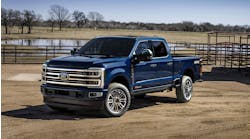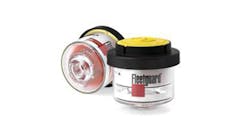What do Yellowstone National Park, Clif Bar & Company, Fort Wayne, Indiana and the City of Phoenix have in common? They are among the thousands of fleets nationwide that rely on biodiesel fuel to get the job done every day in a cleaner, greener and more sustainable way - and without the need for costly vehicle modifications and fueling infrastructure investments.
The City of Phoenix was recently honored as the No. 4 Top Government Green Fleet Award in the nation at the largely due to its steadfast and successful use of B20 biodiesel blends in its entire fleet of more 900 diesel vehicles since 2007. Other avid biodiesel-powered fleets recognized with Government Green Fleet Awards include the City of Fort Wayne, Ind; Las Vegas Valley Water District; Village of Downers Grove, Ill; New York City, N.Y.; Kansas City, Mo.; and Arlington County, Va.
WHY USE BIODIESEL?
Biodiesel is a high quality, domestically produced, renewable, clean-burning alternative to petroleum diesel fuel, and your local fuel supplier is blending it in increasing amounts with traditional diesel.
Using biodiesel is easy. As a drop-in replacement for diesel fuel, biodiesel blends up to B20 (20 percent biodiesel blended with 80 percent petrodiesel) can be used in any diesel vehicle without modification, according to manufacturers’ recommendations, and dispensed through existing fueling stations. So, biodiesel offers an instant way to green a fleet without costly equipment investments.
Biodiesel blends also yield the same kind of horsepower, torque, fuel economy and performance fleet demands from their hard-working diesel vehicles. Biodiesel increases the cetane of diesel fuel, making engines run smoother and quieter.
Biodiesel also adds lubricity to the fuel - a key aspect contributing to the long life of diesel engines. Plus, biodiesel is naturally ultra-low in sulfur, so it can be used in the new engines and emissions systems.
Today’s New Technology Diesel Engines (NTDE) run as clean - if not cleaner - than their natural gas or gasoline counterparts, and that proposition gets even better with biodiesel in the mix.
Biodiesel is designated by the U.S. EPA as an Advanced Biofuel under the Renewable Fuels Standard (RFS-2), meaning the agency has determined that biodiesel reduces lifecycle greenhouse gas emissions by more than 50 percent compared with petroleum diesel. This standard calls for the increasing use of low carbon fuels, such as biodiesel, over the next 10 years, eventually ramping up to as much as 5 billion gallons of biodiesel annually by the year 2022 - also helping to substantially offset our nation’s imports of foreign oil.
Biodiesel is made from an increasingly diverse mix of cost effective renewable resources, such as recycled cooking oil, soybean oil and animal fats. With biodiesel, you don’t sacrifice food for fuel. The oils and fats used for biodiesel are minor by-products of producing high protein feeds (soybean meal) and quality meats.
Biodiesel is produced in nearly every state in the country and supports some 50,000 domestic jobs nationwide, with more 1.7 billion gallons of biodiesel expected to be produced by the end of 2013.
OEM SUPPORT AND VEHICLE OPTIONS
With 36 new clean diesel vehicle models available now or launching soon in the 2014 model year, automotive industry experts predict that there will be more than 54 diesel vehicle models to choose from in North America by 2017 - the majority of which are expected to be approved by the automakers for use with B20 biodiesel blends. That is welcome news for fleets that want the power and performance of a diesel engine while minimizing their impact on the environments they operate in.
Currently, all major original equipment manufacturers (OEMs) selling diesel vehicles and equipment in the U.S. support the use of at least B5 (5 percent biodiesel blended with 95 percent petroleum diesel) under warranty. More than 78 percent of the OEMs support the use of B20 or higher biodiesel blends in at least some of their equipment, including nearly 90 percent of the medium and heavy duty truck models.
Some of the notable OEM champions for biodiesel include:
- General Motors’ new 2014 Chevy Cruze diesel passenger car – the first U.S. light duty diesel sedan fully approved for use with B20 biodiesel blends.
- GM’s 2011 and newer model year GMC Sierra HD and Chevrolet Silverado HD pickup trucks and GMC Savana and Chevrolet Express cargo vans are fully approved for B20, with earlier models approved for B5.
- Ford’s complete line of Super Duty and medium duty diesel trucks (F250 to F750) in model year 2011 and newer and the new Ford Transit commercial van are approved for use with B20. Older diesel models are approved for use with up to B5.
- Chrysler’s Ram 2500/3500 diesel pickup fully supports the use of B20, as does its new little brother, the 2014 Ram 1500. Ram is now the only brand to offer a small-displacement diesel for its half-ton line of trucks. The use of B20 biodiesel is validated and approved for this new 3.0-liter EcoDiesel engine.
- Chrysler is introducing a new Ram ProMaster cargo van in 2014 with biodiesel blend approval for B20 and a new 2014 Jeep Grand Cherokee diesel SUV which is also B20-approved.
- Hino Trucks, Isuzu Commercial Trucks, Cummins, Freightliner, Western Star, Mack, Volvo Trucks, Navistar, Caterpillar and John Deere are among the many other brands that support the use of B20 biodiesel blends in their vehicles and equipment.
For more information and a complete listing of OEM position statements on biodiesel, as well as the current list of U.S. Diesel Vehicles, visit www.biodiesel.org/using-biodiesel/oem-information.
BIODIESEL QUALITY
The U.S. biodiesel industry has invested more than 20 years of time and effort, along with millions of dollars in research and development, partnering with automakers and research institutions, such as the National Renewable Energy Lab, to ensure the production of a high quality, fit for purpose fuel meeting strict quality specifications.
Biodiesel production is guided by stringent fuel quality standards as specified by standards development organization ASTM International: ASTM D6751 for pure biodiesel used as a blend stock with petrodiesel and ASTM D7467 for B6-B20 biodiesel blends. In addition, the diesel fuel specification (ASTM D975) now includes an allowance for up to five percent biodiesel as part of the standard diesel fuel pool.
Furthermore, the biodiesel industry implemented an excellent fuel quality program called BQ-9000. BQ-9000 Certified biodiesel producers, marketers and laboratories help ensure that only the highest quality biodiesel meeting ASTM specifications gets dispensed into your fuel tanks, and a new BQ-9000 Retailer program is coming soon.
OEMs and fleets can feel confident in the fact that more 85 percent of the biodiesel in the U.S. marketplace is produced by BQ-9000 accredited companies, and that percentage continues to grow steadily. Visit www.BQ-9000.org for updates and a listing of certified suppliers.



